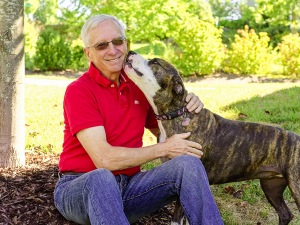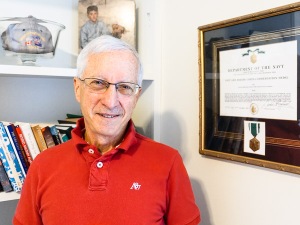Stephen Frost, with Mia, his pit bull/labrador, greets me in his driveway and leads me into his spartan study. He’s soft-spoken, lean, and looks younger than his age. He gently reprimands Mia, who is excited and anxious in my presence. She takes a moment to process the command, calms, and is soon licking my fingers. Stephen closes the door behind us quietly. His son, daughter-in-law, and 4-month-old grandson are living with him at the moment, and the baby is asleep in the next room.
 Family photographs, including a yellowed military portrait of a World War II relative, sit on a bookshelf. Several items of naval memorabilia are evident. On the wall I see framed service awards, including the Navy and Marine Corps Commendation Medal, awarded to Captain Frost for heroic service.
Family photographs, including a yellowed military portrait of a World War II relative, sit on a bookshelf. Several items of naval memorabilia are evident. On the wall I see framed service awards, including the Navy and Marine Corps Commendation Medal, awarded to Captain Frost for heroic service.
He grew up in the rough heart of Philadelphia, living behind the shoe store that his father, an immigrant from Poland in the years between the two great wars, owned. Stephen wanted to be a doctor from an early age. “When we would play baseball I would always take along a little doctor’s kit to take care of injuries.” He calls his journey from inner city youth to physician an American dream.
Studying medicine at Jefferson University, he spent his first fifty years in his hometown, simultaneously teaching and conducting research in gastroenterology at the University of Pennsylvania while maintaining a private, clinical practice, “three things that most physicians would love to do.” He made a satisfying move into hospital administration there and in Maine later in his career. “As a clinical physician I took care of individual patients one at a time, but as an administrator I got to take care of whole populations at once.”
Frost joined the Navy while in medical school. He spent thirteen years as a reservist, left, then rejoined in 1994. He was ca lled to active duty in 2001 to work for the Surgeon General of the Navy, overseeing and deploying about 1,000 doctors in the Bureau of Medicine and eventually overseeing all BUMED reserve medical departments. Only ten days into this assignment he was in the Pentagon when Flight 77 hit on 9/11, and his actions on that day are what the commendations on the wall signify. I ask him if he would care to talk about it. He slowly removes his glasses, wipes away tears that have formed, shakes his head. We move on to other topics. Later, I find newspaper accounts of his heroism in treating the injured on site through the following twenty-four hours.
lled to active duty in 2001 to work for the Surgeon General of the Navy, overseeing and deploying about 1,000 doctors in the Bureau of Medicine and eventually overseeing all BUMED reserve medical departments. Only ten days into this assignment he was in the Pentagon when Flight 77 hit on 9/11, and his actions on that day are what the commendations on the wall signify. I ask him if he would care to talk about it. He slowly removes his glasses, wipes away tears that have formed, shakes his head. We move on to other topics. Later, I find newspaper accounts of his heroism in treating the injured on site through the following twenty-four hours.
Retired, still inclined toward service, but light in spirit these days, Stephen speaks happily of volunteering with the County Sheriff’s Office. And he rides bike patrol in Cataloochee for the National Park Service, keeping elk and tourists safe from each other, unsnarling road backups wherever the animals are sighted. He laughs. “If they knew how much fun I have, I’d probably have to pay the Park Service.”
This article originally appeared in The Biltmore Beacon newspaper.